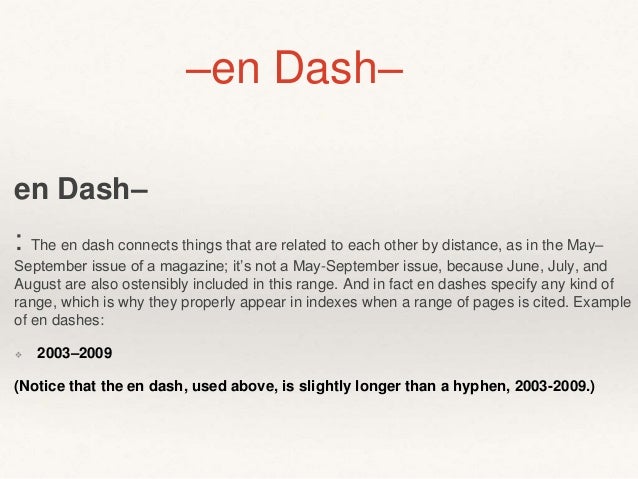
Email instead of e-mail, for example, is increasingly common. Hyphenated words tend to become closed compounds (single words with no hyphens) over time. But when you’re not sure whether a compound word should have a hyphen or not, check a dictionary or style guide. Numbers between twenty-one and ninety-nine should also be hyphenated when they’re spelled out. Some compound words, such as self-restraint are hyphenated. Hope that helps.Grammarly helps you communicate confidently Write with Grammarly When to use hyphens

Em dash examples manual#
These explanations come from the Chicago Manual of Style (with a few small edits on my part to make them easier to translate). You may find the following explanations helpful: There's probably more but that's what my notes say. You can also use multiple em dashes to stand in for missing le-ers (2 for missing letters) or even entire missing - (3 for a missing word). "The wallpaper and I are fighting a duel to the death. If you don't have a "quotation dash", you can use an em dash for that: You can also use it just like a colon, as in this example-that was the example.
Em dash examples movie#
You use an "em dash", -, when you have an open range of numbers: "Craig Ferguson (1962-) had a bit part in the movie Modern Vampires." You can use it to introduce a parenthetical remark-looks a bit old-fashioned in my opinion-instead of parentheses marks. You use an "en dash", –, when you're writing a range of numbers: "there are 5–10 fake noses in this box." You also use it in some places where you would normally use a hyphen, if the thing you're hyphenating already has a space or a hyphen, as in: "this political faction is anti-Australia and pro–New Zealand, I myself am anti–wishy-washy." (Note which is which in that sentence!) I think this one is a matter of style, not a hard rule. Ooh, once upon a time I wrote down a crib sheet to help me remember the difference, I'll try to find it-incidentally, ever since they invented the typewriter it's been mostly ok to just use a hyphen anywhere you need a dashy-thing, sometimes stacking them together if you want it to do the work of something else-ok, found my notes: There is no need in these modern days to resort to such crutches. This is not an acceptable substitution, but rather a holdover from the typewriter era, when a typesetter would replace the doubled hyphens in the manuscript with proper dashes. Two hyphens (-) are sometimes used to indicate an em dash. If you don't have access to thin spaces, it's best to just go ahead and use an em dash rather than use an en dash with full-width spaces. Of course, this opinion is not universally held. Like the oversized space between sentences, it belongs to the padded and corseted aesthetic of Victorian typography. The em dash is the nineteenth-century standard, still prescribed in many editorial style books, but the em dash is too long for use with the best text faces. Robert Bringhurst is a notable proponent of this substitution: Sometimes, an en dash surrounded by narrow spaces – such as thin spaces – is used instead of an em dash to set of parenthetical phrases. The em dash is used for open ranges, such as the lifespan of a living person: 1956.

Rules 1–2 are the most common examples of this. The en dash is used whenever you might otherwise use the word "to". "I'm hiding from-" The call broke off abruptly. "Come help me!" my sister shouted into the telephone. (Notice how you can substitute the em dash with a colon or a period.) Your help has truly been invaluable-you deserve to know that I will always be thankful. (Notice how you can substitute the em dashes with commas or parentheses in this case doing so will change how abrupt the interjection is.) Our friendship-or whatever you wish to call it-has been especially volatile. Em dashes are generally stronger than commas but weaker than colons, parentheses, and periods. Used to set apart a portion of text (e.g., an interjection). (Will we be studying war history or post- history? The en dash helps clarify.) We will be studying post–world war history. Used with compound adjectives when using a hyphen is ambiguous. I'm taking the Atlanta–Chicago flight tonight.

Sometimes used to indicate a route between two geographical points (depends on the style manual you follow). Used to separate certain sequences of numbers. I recommend taking a look at CMOS if you want a more comprehensive overview of proper one style of punctuation usage.

I generally follow CMOS, so these guidelines apply mainly to American English users.


 0 kommentar(er)
0 kommentar(er)
